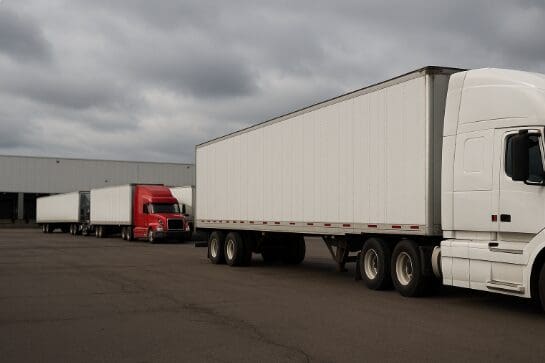A major outage in Amazon Web Services (AWS) on Monday sparked widespread disruption across websites, apps, and back-office systems worldwide — with the logistics and trucking sectors among the industries most significantly affected.
A major outage in Amazon Web Services (AWS) on Monday sparked widespread disruption across websites, apps, and back-office systems worldwide — with the logistics and trucking sectors among the industries most significantly affected. While AWS stated that services were “recovering,” many U.S. users continued reporting issues, highlighting the fragility of a global logistics ecosystem that increasingly runs on cloud-based infrastructure.
The outage, which largely stemmed from issues in AWS’s US-EAST-1 region, affected services tied to DNS routing and database functionality. As a result, numerous transportation management systems (TMS), warehouse management platforms (WMS), telematics dashboards, fleet routing tools, and customer-facing shipment trackers either slowed to a crawl or went completely offline.

Trucks Delayed, Freight Re-Routed, and Fleets Left Blind
Modern trucking fleets rely heavily on cloud-based platforms for dispatching, electronic proof of delivery, route optimization, and real-time GPS tracking. When AWS faltered, so did critical logistics operations.
According to logistics managers interviewed shortly after the outage, some fleets experienced:
- Delays in dispatching trucks, as drivers were unable to receive updated route instructions.
- A temporary loss of visibility, with GPS tracking dashboards unable to retrieve location data from cloud-connected devices.
- Interrupted telematics feeds, affecting refrigerated loads that rely on continuous temperature monitoring.
- Manual fallback procedures, forcing dispatchers to rely on phone calls, emails, or even printed route manifests.
- Customer frustration, as shipment tracking portals became inaccessible or displayed outdated information.
In regions with high freight density such as Texas, Illinois, and California, carriers reported waiting times at distribution hubs while warehouses struggled to confirm orders or digitally release freight.
Digital Warehouses Felt the Shockwave
Warehouse operations were also hit, particularly in facilities that depend on AWS-backed systems for scanning inventory, slotting pallets, issuing pick lists, and generating bill-of-lading documents. A WMS failure can quickly lead to dock congestion and delayed truck turnarounds.
“Even a two-hour digital blackout can lead to a six-hour supply chain disturbance,” said a logistics analyst at a Chicago-based freight optimization firm. “Inbound trucks back up, outbound loads miss their delivery windows, and detention costs pile up.”
Carriers operating cross-border routes — particularly between the U.S., Mexico, and Canada — saw additional delays due to disruptions in digital customs documentation exchanges and milestone confirmations that rely on cloud automation.
Customers Left in the Dark
E-commerce platforms, 3PL providers, and freight marketplaces that depend on AWS-hosted interfaces experienced website and mobile app failures, leaving shippers unable to check load status or place new requests. Customer service hotlines experienced higher call volumes, increasing operational strain and escalating costs for carriers already grappling with slim profit margins.
“Visibility is everything in logistics,” said Maria Delgado, operations director at a mid-sized U.S.-Mexico freight carrier. “When customers can’t see where their freight is, even if the truck is on the road and on time, it becomes a crisis of confidence.”
A Warning for Fleet Operators: Redundancy Is No Longer Optional
The AWS outage underscores a major vulnerability: logistics is no longer just about wheels on the road — it’s about data continuity.
Experts say fleets should now:
✅ Implement multicloud strategies to avoid reliance on a single provider
✅ Maintain offline backup processes for dispatching and proof of delivery
✅ Ensure critical telematics data can failover to local storage or alternate servers
✅ Conduct digital outage drills, similar to cybersecurity breach simulations
✅ Reassess SLAs with cloud providers to ensure compensation for operational loss
Logistics 4.0 Meets Its First Big Stress Test
The logistics and trucking sectors have heavily invested in digital transformation, from AI-powered load matching to autonomous routing engines. Monday’s outage served as a crucial stress test: without cloud access, fleets equipped with cutting-edge digital platforms functioned no better than those running pen-and-paper systems — and sometimes worse.
While AWS began restoring services by Monday afternoon, analysts predict the real-world consequences will be felt for days as routing inefficiencies play out, freight is rebooked, and detention costs are reviewed.
The Bottom Line
As global supply chains continue to digitize, reliance on hyperscale cloud services like AWS, Microsoft Azure, and Google Cloud will deepen. But without adequate redundancy and emergency protocols, logistics operators risk significant financial exposure every time a cloud provider’s server blinks.
For trucking fleets already navigating regulatory shifts, volatile fuel costs, and persistent driver shortages, this outage is more than a disruption — it’s a warning shot.

The Wildest Truck Modifications on the Road Today
Truck customization has become a serious industry, with some builds rivaling high-end RV conversions in complexity and cost. From redesigned sleepers to upgraded suspension systems, these modifications do more than change appearance — they alter weight, electrical load, and the technical profile of the truck.

The most dangerous states in the U.S. during winter weather
While winter conditions are hazardous across the country, some states experience significantly higher accident rates during this season. A study by Samsara, a safety and

Winter storm disruptions lead to FMCSA HOS relief in 40 states
Motor carriers and drivers providing direct assistance in relief efforts in the affected states are covered by a hours-of-service (HOS) exemption. Over the weekend, a

Air Quality Alert in California Impacts Transportation
An air quality alert has been issued as high levels of fine particle pollution (PM2.5) trigger health warnings across several parts of California. The situation is affecting visibility, driver health, and logistics operations, forcing transportation professionals to take extra precautions on highways and in urban corridors

Winter Storm Survival on the Road: What Truck Drivers and Fleet Operators Need to Know Now
Winter storm with snow, ice, and extreme cold are creating dangerous highway conditions across multiple states, forcing truckers to make critical safety decisions before turning the key.

Miles of love: stories of truckers and their four-legged co-pilots
The love between truckers and their pets is a strong bond, and these stories will surely warm your soul. Love manifests itself in many ways,
